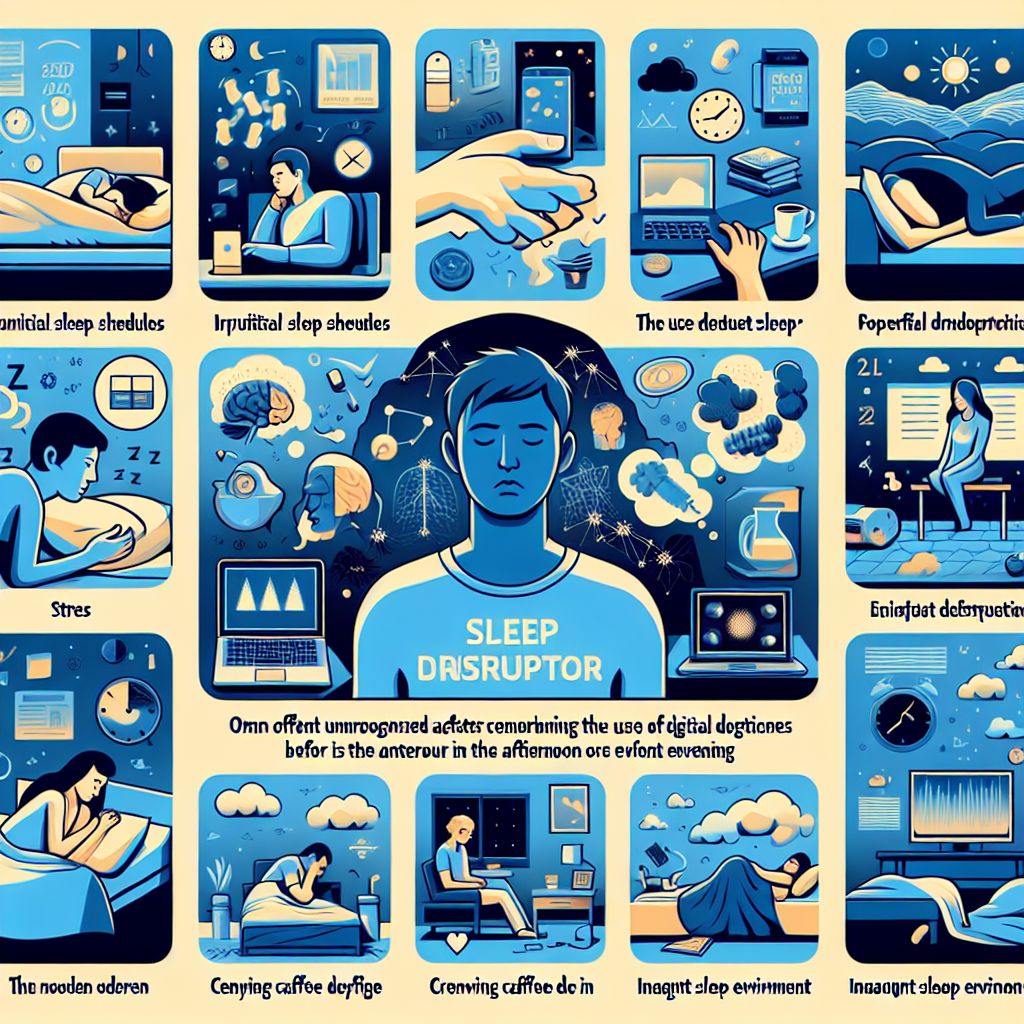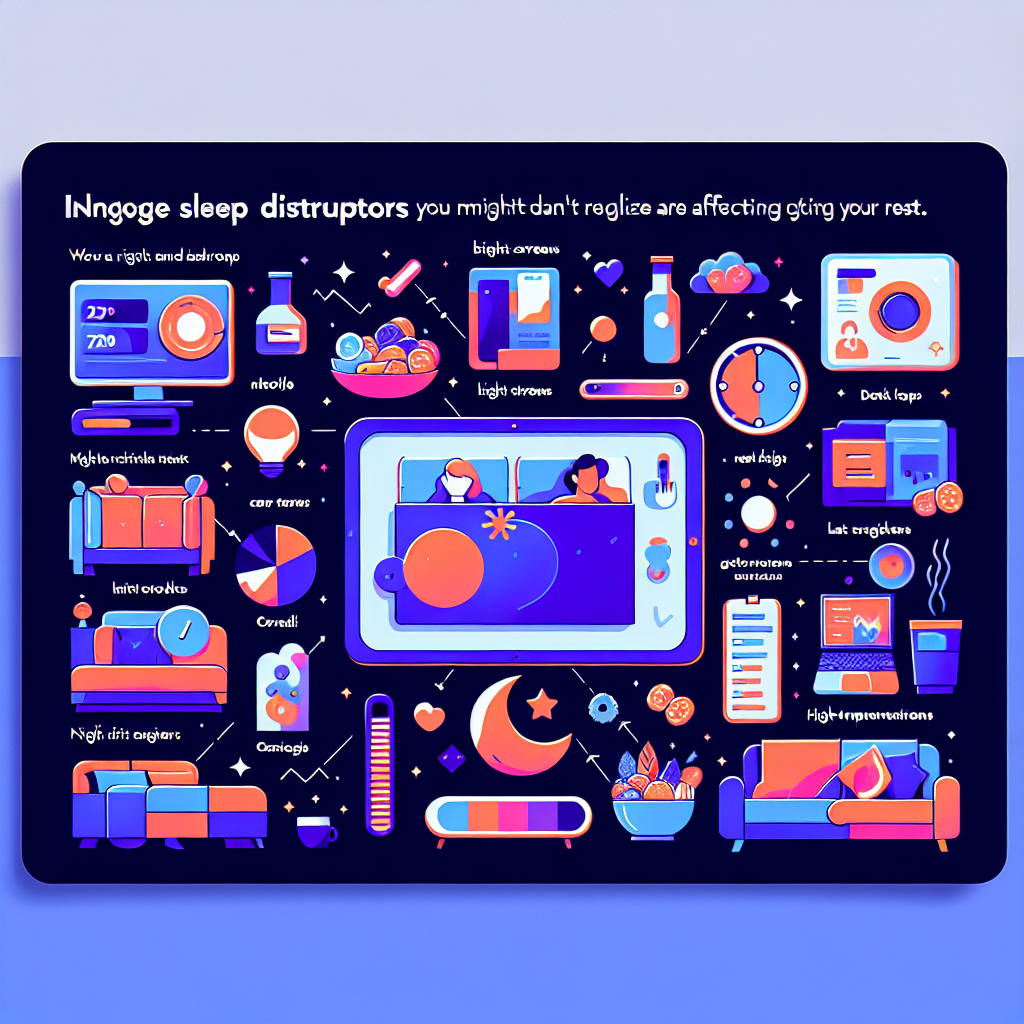Sleep Disruptors You Didn’t Know Were Affecting Your Rest

Discover the unknown sleep disruptors that are affecting your rest. Learn more and take the first step towards a peaceful night’s sleep. Click here to start your journey towards better sleep.
Unseen Factors: Sleep Disruptors You Didn’t Know Were Affecting Your Rest
Sleep is a fundamental human need, as essential as air, water, and food. It is a restorative process that allows our bodies to repair and rejuvenate, and our brains to consolidate memories and process information. However, many of us struggle to get a good night’s sleep, often without realizing the unseen factors that are disrupting our rest.
One of the most common yet overlooked sleep disruptors is light, particularly blue light emitted by electronic devices such as smartphones, tablets, and computers. This type of light interferes with the production of melatonin, the hormone that regulates our sleep-wake cycle. Consequently, using these devices close to bedtime can make it harder to fall asleep and disrupt the quality of your sleep.
Another unseen factor is temperature. Our bodies have a natural sleep-wake cycle known as the circadian rhythm, which is influenced by the temperature of our environment. As we prepare for sleep, our body temperature drops slightly to initiate sleep. However, if our environment is too warm, it can interfere with this process and make it harder to fall asleep. Therefore, maintaining a cool bedroom environment is crucial for good sleep.
Noise is another common sleep disruptor. While some people can sleep through a thunderstorm, others wake up at the slightest sound. Even if you don’t wake up, noise can disrupt the quality of your sleep by causing you to move between the stages of sleep more frequently than you should. This can leave you feeling tired and unrefreshed in the morning, even if you’ve had a full night’s sleep.
Caffeine and alcohol are two substances that many people consume without realizing their impact on sleep. Caffeine is a stimulant that can make it harder to fall asleep and reduce the quality of your sleep. While alcohol can make you feel sleepy, it actually disrupts the quality of your sleep by preventing you from reaching the deeper, more restorative stages of sleep.
Stress and anxiety are also significant sleep disruptors. When we’re stressed or anxious, our bodies produce hormones like cortisol and adrenaline that keep us alert and awake. This can make it hard to relax and fall asleep, and can also lead to nightmares and restless sleep.
Lastly, our sleep can be disrupted by medical conditions such as sleep apnea, a disorder where breathing repeatedly stops and starts during sleep, and restless legs syndrome, a neurological disorder characterized by an irresistible urge to move the legs. These conditions can severely disrupt sleep, but many people are unaware they have them.
In conclusion, many unseen factors can disrupt our sleep, from the light and temperature of our environment to the substances we consume and the stress we experience. By becoming aware of these factors and taking steps to manage them, we can improve the quality of our sleep and, by extension, our overall health and well-being. So, the next time you find yourself tossing and turning at night, consider these unseen factors and take steps to ensure they’re not disrupting your rest.
Hidden Sleep Disruptors: What’s Secretly Affecting Your Rest?

Sleep is a fundamental human need, as essential as air, water, and food. It is a restorative process that allows our bodies to repair and rejuvenate, and our brains to consolidate memories and process information. However, many of us struggle to get a good night’s sleep, often without realizing the hidden disruptors that are secretly affecting our rest.
One of the most common yet overlooked sleep disruptors is the use of electronic devices before bedtime. The blue light emitted by smartphones, tablets, computers, and televisions can interfere with the production of melatonin, the hormone that regulates our sleep-wake cycle. This can make it harder to fall asleep and disrupt the quality of our sleep. To mitigate this, it is recommended to avoid using these devices for at least an hour before bedtime.
Another hidden sleep disruptor is caffeine. Many of us rely on a cup of coffee or tea to kick-start our day, but consuming caffeine even six hours before bedtime can interfere with our sleep. Caffeine can delay the timing of our body clock, reduce the amount of deep sleep we get, and increase the likelihood of waking up during the night. Therefore, it is advisable to limit caffeine intake to the early part of the day.
Stress and anxiety are also significant sleep disruptors. The worries and tensions of the day can keep our minds active at night, making it difficult to relax and fall asleep. Moreover, stress can increase the production of cortisol, a hormone that promotes alertness, further disrupting our sleep. Practicing relaxation techniques such as deep breathing, meditation, or yoga before bedtime can help reduce stress and improve sleep quality.
Our sleep environment can also significantly impact our sleep. A room that is too hot, too cold, too noisy, or too bright can disrupt our sleep. The ideal sleep environment is cool, quiet, dark, and comfortable. Using earplugs, eye shades, or white noise machines can help create a more conducive sleep environment.
Diet is another factor that can affect our sleep. Eating large meals close to bedtime can cause discomfort and indigestion, making it harder to fall asleep. Certain foods and drinks, such as those high in sugar or alcohol, can also disrupt our sleep. It is recommended to have a light dinner a few hours before bedtime and to limit the intake of sugary foods and alcohol.
Lastly, lack of regular physical activity can disrupt our sleep. Regular exercise can help regulate our sleep-wake cycle, reduce stress and anxiety, and improve the quality of our sleep. However, it is important to avoid vigorous exercise close to bedtime as it can stimulate the body and make it harder to fall asleep.
In conclusion, many hidden factors can disrupt our sleep, from the use of electronic devices and caffeine intake to stress, sleep environment, diet, and lack of physical activity. By being aware of these sleep disruptors and taking steps to mitigate them, we can improve the quality of our sleep and, consequently, our overall health and well-being. After all, a good night’s sleep is not a luxury, but a necessity.
The Unknown Enemies of Sleep: Disruptors Affecting Your Rest
Sleep is a fundamental human need, as essential as air, water, and food. It is a restorative process that allows our bodies to repair and rejuvenate, and our brains to consolidate memories and process information. However, many of us struggle to get a good night’s sleep, often without realizing the hidden culprits that are disrupting our rest. These unknown enemies of sleep, or sleep disruptors, can significantly affect the quality and quantity of our sleep, leading to a host of health problems.
One of the most common yet overlooked sleep disruptors is light, particularly blue light emitted by electronic devices such as smartphones, tablets, and computers. Exposure to this type of light in the evening can interfere with the production of melatonin, the hormone that regulates our sleep-wake cycle. Consequently, this can make it harder for us to fall asleep and stay asleep. Therefore, it is advisable to limit the use of electronic devices before bedtime to ensure a more restful sleep.
Another unsuspected sleep disruptor is caffeine. While many of us rely on a cup of coffee or tea to kick-start our day, consuming these beverages later in the day can interfere with our sleep. Caffeine is a stimulant that can stay in our system for several hours, keeping us alert and awake when we should be winding down. To avoid this, it is recommended to avoid consuming caffeine at least six hours before bedtime.
Noise is another factor that can disrupt our sleep without us even realizing it. Even if we don’t fully wake up, noise can shift us out of deep sleep into a lighter stage of sleep, reducing the overall quality of our rest. This can be particularly problematic in urban environments, where traffic noise, sirens, and other sounds can be a constant source of disruption. Using earplugs or a white noise machine can help to mitigate this issue.
Temperature also plays a crucial role in our sleep quality. Our bodies need to drop a few degrees to initiate sleep, and maintaining a cool environment can facilitate this process. However, many of us unknowingly sleep in rooms that are too warm, which can lead to restless nights. Experts recommend keeping the bedroom temperature between 60 and 67 degrees Fahrenheit for optimal sleep.
Lastly, our eating habits can also affect our sleep. Eating large meals close to bedtime can cause discomfort and indigestion, making it harder to fall asleep. Similarly, consuming alcohol before bed can disrupt the sleep cycle, leading to poor quality sleep. It is advisable to finish eating at least two to three hours before bedtime and to limit alcohol consumption for better sleep.
In conclusion, many factors can disrupt our sleep without us even realizing it. By becoming aware of these sleep disruptors and taking steps to mitigate their impact, we can improve the quality and quantity of our sleep, leading to better health and well-being. After all, a good night’s sleep is not a luxury, but a necessity for our physical and mental health.